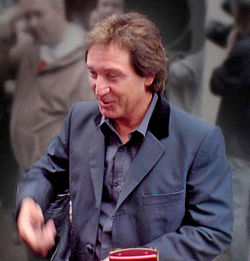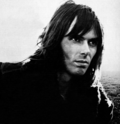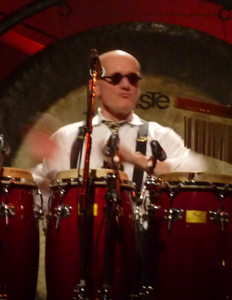| Period | Members | Studio and live releases |
|---|
The Detours
(1962 – January 1963) | | |
|---|
The Detours
(January–December 1963) | - Gabby Connolly – lead vocals
- Pete Townshend – lead guitar
- Roger Daltrey – rhythm guitar, backing vocals
- John Entwistle – bass, backing vocals
- Doug Sandom – drums
| |
|---|
The Detours / The Who [A]
(December 1963 – April 1964) | - Roger Daltrey – lead vocals, harmonica
- Pete Townshend – lead and rhythm guitars, backing vocals
- John Entwistle – bass, backing vocals
- Doug Sandom – drums
| |
|---|
The Who [B]
(April 1964 – September 1978) | - Roger Daltrey – lead vocals, harmonica
- Pete Townshend – lead and rhythm guitars, keyboards, backing and lead vocals
- John Entwistle – bass, backing and lead vocals
- Keith Moon – drums, occasional vocals [C]
| |
|---|
Death of Keith Moon
(7 September 1978) | |
|---|
The Who
Who Are You Tour
(1979–1980) | - Roger Daltrey – lead vocals, harmonica
- Pete Townshend – lead and rhythm guitars, backing and lead vocals
- John Entwistle – bass, backing and lead vocals
- Kenney Jones – drums
with | |
|---|
The Who
Face Dances Tour
(1981) | - Roger Daltrey – lead vocals, harmonica
- Pete Townshend – lead and rhythm guitars, backing and lead vocals
- John Entwistle – bass, backing and lead vocals
- Kenney Jones – drums
with - John "Rabbit" Bundrick – keyboards
| |
|---|
The Who
It's Hard Tour
(1982) | - Roger Daltrey – lead vocals, rhythm guitar, harmonica
- Pete Townshend – lead guitar, backing and lead vocals
- John Entwistle – bass, backing and lead vocals
- Kenney Jones – drums
with | |
|---|
Hiatus
(1983–1988) | |
|---|
One-off performances
at Live Aid (1985) and the
BPI Awards Ceremony (1988) | - Roger Daltrey – lead vocals, harmonica
- Pete Townshend – lead and rhythm guitars, backing vocals
- John Entwistle – bass
- Kenney Jones – drums
with - John "Rabbit" Bundrick – keyboards
| |
|---|
The Who
25th Anniversary Tour
(1989) | - Roger Daltrey – lead vocals, rhythm guitar, harmonica
- Pete Townshend – lead, acoustic, and rhythm guitars, backing and lead vocals
- John Entwistle – bass, occasional vocals
with | |
|---|
One-off performance at the
Rock and Roll Hall of Fame
Induction Ceremony (1990) | - Roger Daltrey – lead vocals
- Pete Townshend – lead and rhythm guitars, backing vocals
- John Entwistle – bass
with | |
|---|
Hiatus
(1990–1995) | |
|---|
The Who
Quadrophenia Tour
(1996–1997) | - Roger Daltrey – lead vocals, rhythm guitar, harmonica
- Pete Townshend – lead and rhythm guitars, backing and lead vocals
- John Entwistle – bass
with - John "Rabbit" Bundrick – keyboards
- Zak Starkey – drums
- Simon Townshend – rhythm and lead guitars, backing vocals
- Jon Carin – keyboards
- Jody Linscott – percussion
- Dennis Farias – horn section
- Nick Lane – horn section
- Roy Wiegand – horn section
- Simon Gardner – trumpet
- Neil Sidwell – trombone
- Billy Nicholls – backing vocals, musical director
| |
|---|
The Who
(1999 – February 2002) | - Roger Daltrey – lead vocals, rhythm guitar, harmonica
- Pete Townshend – lead guitar, backing and lead vocals
- John Entwistle – bass, occasional vocals
with - John "Rabbit" Bundrick – keyboards [D]
- Zak Starkey – drums
| |
|---|
The Who
(February–June 2002) | - Roger Daltrey – lead vocals, harmonica
- Pete Townshend – lead guitar, backing vocals
- John Entwistle – bass
with - John "Rabbit" Bundrick – keyboards
- Zak Starkey – drums
- Simon Townshend – rhythm guitar, backing vocals
| none – This line-up rehearsed for the 2002 tour, but did not actually perform in concert, as John Entwistle died shortly before the first show of the tour. |
|---|
Death of John Entwistle
(27 June 2002) | |
|---|
The Who
(July 2002 – 2011) | - Roger Daltrey – lead vocals, rhythm guitar, harmonica
- Pete Townshend – lead guitar, backing and lead vocals
with - John "Rabbit" Bundrick – keyboards [a]
- Zak Starkey – drums [E]
- Simon Townshend – rhythm guitar, backing vocals
- Pino Palladino – bass [E]
| |
|---|
One-off performance at the
2012 Summer Olympics
closing ceremony (2012) | - Roger Daltrey – lead vocals
- Pete Townshend – lead guitar, backing vocals
with - Zak Starkey – drums
- Simon Townshend – rhythm guitar, backing vocals, keyboards
- Billy Nicholls – backing vocals, musical director
- Morgan Nicholls – bass
- Chris Stainton – piano, keyboards
| |
|---|
The Who
Quadrophenia and More Tour
(2012–2013) | - Roger Daltrey – lead vocals, rhythm guitar, harmonica
- Pete Townshend – lead guitar, backing and lead vocals
with - Zak Starkey – drums [F]
- Simon Townshend – rhythm guitar, backing vocals
- Pino Palladino – bass
- Frank Simes – keyboards, backing vocals, musical director
- Loren Gold – keyboards, backing vocals
- John Corey – piano, keyboards, backing vocals
- J. Greg Miller – brass
- Reggie Grisham – brass
| |
|---|
The Who
(2014–2016) | - Roger Daltrey – lead vocals, rhythm guitar, harmonica
- Pete Townshend – lead guitar, backing and lead vocals
with - Zak Starkey – drums
- Simon Townshend – rhythm guitar, backing vocals
- Pino Palladino – bass
- Frank Simes – keyboards, backing vocals, musical director
- Loren Gold – keyboards, backing vocals
- John Corey – piano, keyboards, backing vocals
| |
|---|
The Who
(2017) | - Roger Daltrey – lead vocals, rhythm guitar, harmonica
- Pete Townshend – lead guitar, backing and lead vocals
with - Zak Starkey – drums
- Simon Townshend – rhythm guitar, backing vocals
- Frank Simes – keyboards, backing vocals, musical director
- Loren Gold – keyboards, backing vocals
- John Corey – keyboards, backing vocals
- Jon Button – bass, backing vocals
| - Tommy Live at the Royal Albert Hall (2017)
|
|---|
The Who
(2019–2022) [62] | - Roger Daltrey – lead vocals, rhythm guitar, harmonica
- Pete Townshend – lead guitar, backing and lead vocals
with - Zak Starkey – drums
- Simon Townshend – rhythm guitar, backing vocals
- Loren Gold – keyboards, backing vocals
- Jon Button – bass, backing vocals
- Billy Nicholls – backing vocals, musical director
- Katie Jacoby – lead violin
- Audrey Q. Snyder – lead cello
- Emily Marshall – keyboards, associate conductor
- Keith Levenson – conductor
| - Who (2019) (with Palladino)
|
|---|
| The Who (2022–2025) | - Roger Daltrey – lead vocals, rhythm guitar, harmonica
- Pete Townshend – lead guitar, backing and lead vocals
with - Zak Starkey – drums
- Simon Townshend – rhythm guitar, backing vocals
- Loren Gold – keyboards, backing vocals
- Jon Button – bass, backing vocals
- Billy Nicholls – backing vocals, musical director
- Randy Landau – contrabass
- Katie Jacoby – lead violin
- Audrey Q. Snyder – lead cello
- Emily Marshall – keyboards, associate conductor
- Keith Levenson – conductor
| none |
|---|
| The Who (2025–present) | - Roger Daltrey – lead vocals, rhythm guitar, harmonica
- Pete Townshend – lead guitar, backing and lead vocals
with - Simon Townshend – rhythm guitar, backing vocals
- Loren Gold – keyboards, backing vocals
- Jon Button – bass, backing vocals
- John Hogg – backing vocals, percussion
- Katie Jacoby – violin
- Scott Devours – drums
- Jody Linscott – percussion
| none to date |
|---|






















































